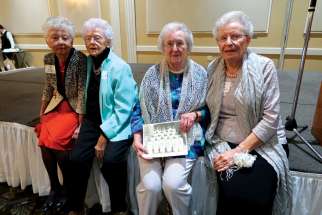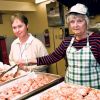Notre Dame sisterhood still going strong after 75 years
75 years living the Gospel
The Felician Sisters this year look back on 75 years of careful, quiet and competent work on behalf of people the rest of us have brushed aside.
A human scale and a human touch have been their hallmark.
“Our goals are more modest in terms of structures and things like that,” explains Felician Sister Shelley Marie Jeffrey. “We just think it’s more important to touch people’s spirit than to be behind something that people will look at and say ‘Wow.’ ”
In 1937, in the teeth of the Great Depression, most of the sisters were Polish immigrants or daughters of Polish immigrants. They arrived in a poor, immigrant neighbourhood near Dundas and Bathurst Streets where men were unemployed or on the road or both and women were struggling to keep families together and their kids in school.
The sisters set themselves up as go-betweens, translating and interpreting the English world to the Polish immigrants, helping the kids with homework, gathering women to talk over troubles and challenges, keeping the youngest safe and occupied.
In the forms of after-school programs, youth drop-ins, ESL classes for adults and computer classes, the work the Felicians began in 1937 continues today.
“We still work with immigrants. There are a lot of families whom we serve that are new to Canada,” Jeffrey said.
In 1937 the broken economy produced its share of broken people. That hasn’t changed either. The sisters still feed and clothe people who are never going to be contributors to the economy.
“The people we serve are the lepers of society,” Jeffrey said. “I don’t mean that in a derogatory way. But they’re the outcast people that we don’t want around. They’re mentally ill.They’re addicted. They don’t present themselves very well.”
Hot meals and clean clothes available at the St. Felix Centre only open the door to what the Felicians really offer to the poor, said St. Felix Centre executive director Paddy Bowen.
“We are not in the business of changing people. We are in the business of accepting them — where they are and what they are.”
Foundations and governments mostly want agencies to fix the poor — get them jobs, find housing, cure addictions and illnesses. There’s nothing wrong with that, but the sisters are there for a different purpose, said Bowen.
“We are actually not in the fixing or changing or transforming arena. Although, what you find of course is that there is nothing more transforming than being accepted,” she said.
The next step after acceptance is community. By offering people meals in a human-scale, intimate dining room and allowing time to sit and talk, the sisters have for years invited people into their community. It’s that sense of community that makes the St. Felix Centre a little different from the 75 other drop-ins in Toronto.
The St. Felix Centre community extends well beyond the poor, homeless and socially isolated. The centre runs with just seven full-time staff and 450 volunteers.
But this last year the invitation has gone a step further. The Felicians no longer live in the gingerbread mansion that was their convent back in 1937. A group of women and their children now occupy the house, which will soon undergo renovations so it can comfortably house even more.
“We developed that program specifically not to be a rooming house,” said Jeffrey. “But to be a community. That’s what we know. We know the value of it and we know the challenges of it.”
It’s a classic case of a religious order sharing its charism — letting everybody in on their mission.
“Our call is to live in Franciscan community. It is to live in simplicity. It’s to be responsive,” Jeffrey said. “We’re not unique in that, but we find ways to be unique. We’ve never specialized in one ministry. There are no two people in our community doing the same thing.”
Nor are the Felicians satisfied to keep doing the same thing year after year.
The neighbourhood around the St. Felix Centre is changing rapidly with injections of new money , condos and professionals who choose a downtown lifestyle. The sisters have been looking around to see where their talent for creating community might be needed more.
At 2195 Jane St., a 46-year-old, 11-storey tower operated by Toronto Community Housing Corp., the sisters have launched a weekly communal dinner for Jane- Finch residents. Depending how local partners and the community react, the program may expand to seven days a week.
For the sisters, discernment means slowly and carefully figuring out what people really need and how they can help.
“Given our resources, given our experience, what can we offer that other people can’t?” is the central question, said Jeffrey.
“The Felicians are down to under 40 in Canada,” said Bowen. “How often do we see a group of people who just selflessly dedicate their lives to living for other people?
“The new evangelization is terribly challenging but it’s also really exciting,” said Jeffrey. “Our main approach to evangelization here is, we don’t try to evangelize except by the way we live the Gospel values.”



